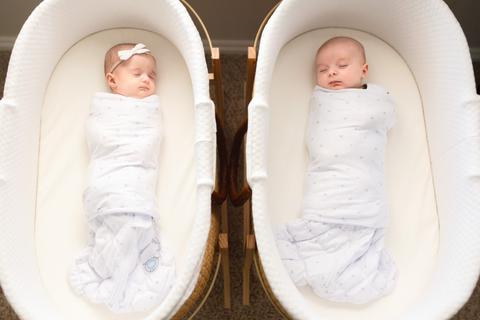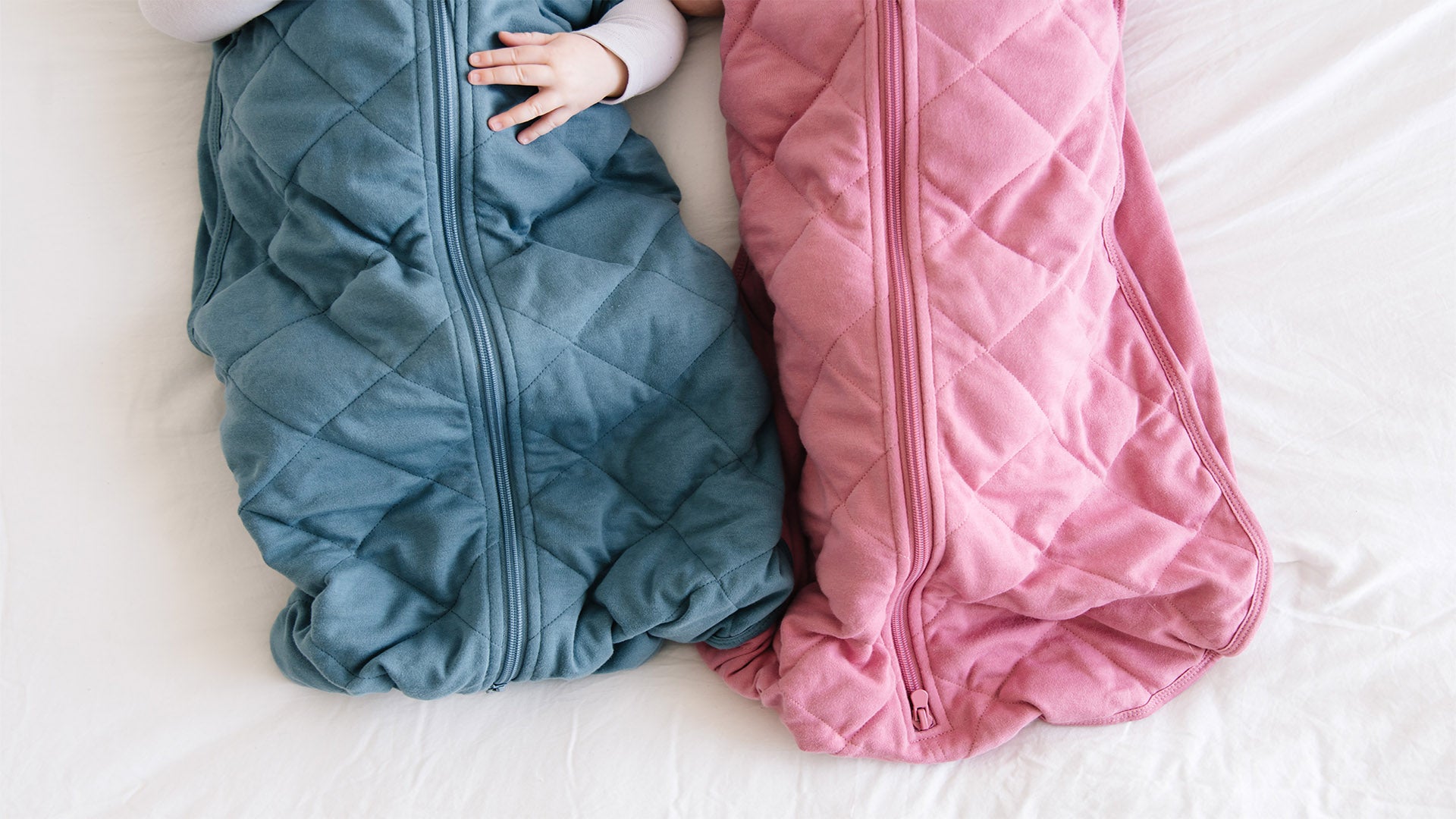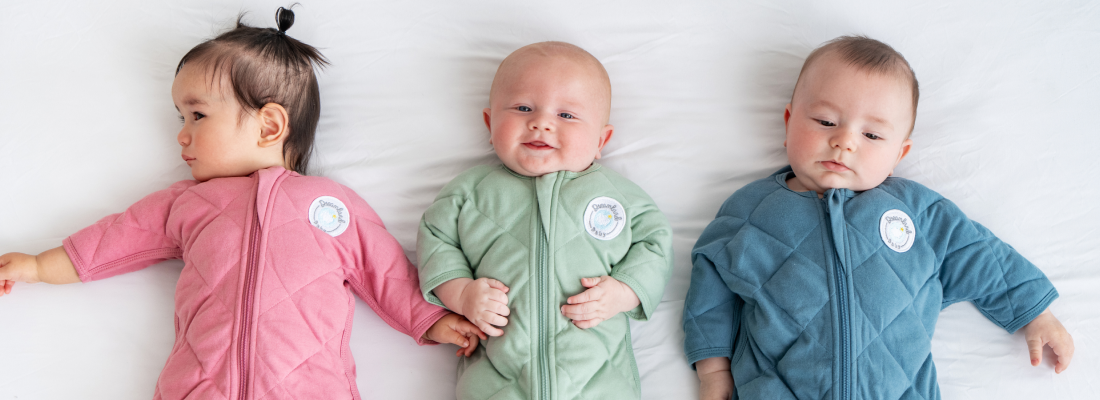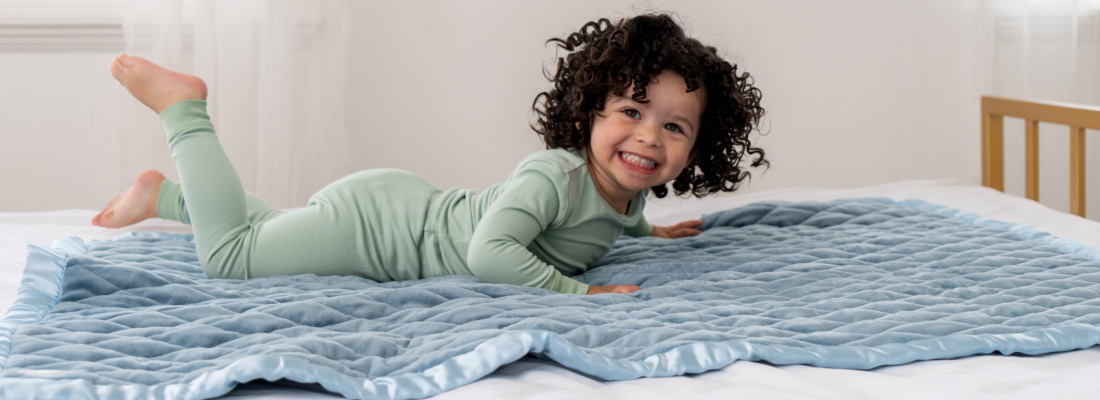Newborn Twins Schedule
All new parents experience a level of exhaustion they've likely never known before when they bring home their new baby. From the first night in the hospital it's pretty apparent that it's time to accept a new normal when it comes to sleep. Even though it's worth it and you'd do it all over again, any extra minute of sleep is one to be celebrated. But what if you have twins? Double the sweetness, double the sleep challenges.
Parents of twins who've been there will tell you that you'll get through it! Just like any challenging phase in a little one's life, it won't last forever. Especially if you're willing to implement some tried and true tips for helping your newborn twins sleep. We’ll give you those tips along with challengs to expect with your newborns’ sleep, how to choose the best sleeping arrangement and routine to maximize sleep, as well as the best way to moveyour twins into a sleep schedule when they're ready.

Sleep Expectations When You Have Twins
Since it's not recommended to formally "sleep train" your babies until they are close to four months old, parents are very much at the mercy of their baby's natural sleeping patterns. That "fourth trimester" period we discuss in this article, though filled with a lot of joy, can also be extremely tiring while your little one figures out life in the outside world.
Since each baby is unique, this means that parents of twins experience the normal sleep challenges of having a newborn...times two.
This could include:
- Different feeding times - When twins are born, one is often larger than the other twin. This can mean that the larger baby is able to go a longer time between feedings whereas the smaller baby will need to eat more often to bulk up their weight. Babies that don't eat on a similar schedule equates to you getting up much more frequently to feed them in the middle of the night.
- More frequent feedings due to lower birth weight - According to Verywell Family, the majority of twins are born earlier and weigh less than single birth babies. Babies born prematurely will need to eat much more frequently than a baby who was born full-term.
- Trying to keep one baby from waking the other - Another difficulty to note that parents of one baby may not consider is how quick parents will be to quiet one of the twins if they are fussing. Often twin parents will rush in to quiet one of the babies so that the other one doesn't wake up. This can lead to less sleep for everyone.
Here's the bottom line. If it's hard with one, it's going to be harder with two. But, we have some tips to help get your twins' sleep on track as soon as possible. This starts by determining what the best sleeping arrangement will be.
Determining Your Twins' Sleeping Arrangement
As a parent who has twins on the way you have a lot to think about, including where your twins will sleep. One of the burning questions you likely have is if your twin babies can sleep in the same bed or if it’s better for them to be separately. Let’s talk about your options and what’s recommended.
Of course your number one priority when doing anything for your little ones is to ensure that it is safe. We will always align our recommendations with the AAP as your baby’s safety is our top priority, too. With that said, when determining the best sleeping arrangement for your twins, you’ll ultimately make the best choice for your family but we recommend you do so in conjunction with guidance from your pediatrician.
Option 1 (Recommended): Room Sharing with Twins Sleeping Separately
Whether you have a singleton or multiples, the guidance by the AAP suggests that infants sleep in the same room as their parent(s) until at least 6 months of age to create the safest sleeping arrangement.
Additionally, room sharing can alleviate the need to have to constantly be checking a monitor or going to your babies’ room to check on them. Choosing this option can take a lot of stress off new parents and also makes it easier to feed and comfort them as needed. And with double the number of kiddos you’ll need to care for, I can’t recommend this enough!
Even though they’ll be in the same room as you, it’s still best to keep your twins in their own bassinets. You can also choose something like a twin co-sleeper which keeps your twins close to one another but still sleeping separately for ultimate safety.
Option 2: Twins Sleeping Separately in Their Own Room
We know we all do our best to follow the recommended guidelines of the AAP, but there are also times that we follow our gut as a parent and do what we think is best. Though we do think it’s important for you to room share with your twins for at least an initial period (especially if they were born prematurely), you may choose to transfer them to their own room at some point.
If you or your babies are continuously seeing a marked reduction in sleep due to room sharing, you may choose to make the switch sooner. You know your situation better than anyone else, so as long as you feel good about your decision, you can switch your babies to their own room when you feel it’s time. Be sure to read, “How to Move Your Baby to Their Own Room,” for all of our tips!
Option 3: Co-Bedding
Co-Bedding refers to twins sharing a crib space to sleep (not to be confused with co-sleeping which is when a baby sleeps in their parents’ bed.) Though putting your twins together in the same crib sounds ideal and creates an incredibly sweet image, you’ll want to take caution here. The AAP states, “The safety and benefits of cobedding for twins and higher-order multiples have not been established. It is prudent to provide separate sleep surfaces and avoid cobedding for twins and higher-order multiples in the hospital and at home.”
Therefore, it’s preferable for your babies to sleep in separate spaces. But even with this recommendation, many parents of twins still choose to have their babies sleep in the same crib. There are often benefits stemming from creating an environment that mimics their life in the womb, one being that they may have more aligned sleep patterns.
If co-bedding seems like the best option for your babies, we encourage you to have a conversation with your pediatrician to determine what’s best.
When finalizing the sleeping arrangement for your baby weighing the benefits and risks of each option is important. You want to keep your babies safe while also considering your own sanity and sleep, as well. No matter which option you choose, you’ll want to instill a sleep routine so your twins know what to expect when it’s bedtime.
Implementing a Newborn Twin Sleep Routine
Almost every baby thrives off of routine. Babies depend on their parents to guide them and that includes understanding cues that it’s time to sleep. We recommend a sleep routine for all parents, but as a twin parent, it’s even more important that you get a sleep routine set up sooner rather than later.
We’re not saying you need to worry about this in those first few weeks as you transition to home, but it’s never too early to start good habits.
This is an outline of a sleep routine that we love that you can perform at bedtime:
-
Calming bath 45 minutes – 1 hour before bedtime
- Infant massage
- Clothe with diaper and jammies
- Place your baby in a Dreamland Baby weighted swaddle (or in a weighted wearable blanket for any baby that’s showing signs of rolling over)
- Darken the room by turning off the lights and drawing blackout curtains
- Sing or turn on white noise (read "Best Music for Baby Sleep")
- Rock your twins, nursing or feeding tandemly if you are able (or share the load between parents)
- Always lay your baby down on their backs – still awake, but clearly drowsy
With twins, a routine can be a bit more tricky if you have one baby who is a bit more ready for sleep while the other is not. It's ok to take more time with one as needed or rub their back until they fall asleep. As your babies get a bit older and you get them on a schedule the routine should become easier (which we’ll discuss later on how to do!)

RELATED: How to Get your Baby to Sleep in a Crib
A sleep routine is a lovely thing and you’ll soon start reaping the benefits of your hard work in keeping up with it. But this is just one of many tips to helping your twins (and you!) sleep your best. Read on to find out what else we recommend.
Other Top Tips for Helping Your Newborn Twins Sleep
-
Don't rush to your baby's side with every little noise or cry. Twin parents fear that the other baby will be woken up. But newborns are actually very used to noise. In fact, the sounds in the womb are louder than a vacuum cleaner. By allowing each twin to get used to sleeping through noise, you'll be on your way to allowing them to sleep longer stretches much sooner as well as helping them self-soothe to go back to sleep.
-
Work to get your babies feeding at the same time. Since it's likely your babies will have different birth weights, you won't be able to do this right away. It's important to feed your baby when they are hungry, especially until you've gotten the go-ahead from your babies' pediatrician for them to go longer stretches. But once babies are gaining weight well and your milk supply is well established (usually within a few weeks) it will be a lot easier to get your twins feeding at the same time.
In order to make this work, you're going to have to wake one of your little ones up to feed (even at night). If you're breastfeeding you can use the football hold to feed them simultaneously. Or, you can give one a bottle while breastfeeding the other. (Then switch for the next feeding). Getting your babies eating at the same time is key for more sleep. Otherwise, you're getting up much more frequently at night to feed them separately.
-
Create a soothing sleep environment. It's hard when babies have their days and nights mixed up, but you can help both of your babies separate the two pretty early on. Even young babies can start to learn cues so they know that nighttime is meant for long stretches of sleep. This can be done by giving your babies plenty of wake time during the day and not letting naps go longer than a couple of hours. This allows for more feeds during the day, making your twins nice and full for the majority of the night ahead. A consistent nighttime routine which includes a bath, swaddling, dimmed lights, lullabies, rocking, feeding, and white noise will help your babies be ready for a great night's sleep.
- Swaddle each of your twins. Almost all new babies love being swaddled because of the closeness it gives them from being in the womb. It's important to remember that your twins had even less space than a singleton baby, so a swaddle is a great way to get your babies comforted sooner and sleeping for longer stretches. The Dreamland Baby Weighted Blanket with Swaddle is the perfect way to help soothe your twins to help them sleep. Not only does it remind them of being in their mom's tummy, but the weight of it also mimics your touch. When your twins begin to roll over, you can transition them to the weighted blanket without the swaddle. And be sure to always put them to sleep on their backs, drowsy but awake.
Mom Leslie H. writes: After four months with twin babies we were ready to sleep train. First thing we did was buy Dreamland Baby for our twins. Only after two days, both babies slept from 10pm to 6:30am. It has been 3 months and my babies still sleep all night long! We have purchased 3 bundle sets so far and it’s worth every penny!
Creating a Sleep Schedule for Your Twins
All of the above tips are tried and true work well from the newborn stage on. The last thing to cover is how to get a sleep schedule established when you’re working with two babies that have personalities all their own.
You’re likely wondering at what age you’ll want to get your twins on a schedule. (Remember, this isn't sleep training just yet - save that for closer to 4 months.) Even though determining this is never “one-size-fits-all” we’ve found that many babies are ready around 2 months (use corrected age for any babies born premature). In our article, “Starting a Sleep Schedule for Your 2-Month Old Baby,” sleep consultant Marietta Paxson of littledreamers.us writes, ““One of the reasons two months is a good age to begin to think about your baby's schedule is because most babies have figured out their days and nights.”
If you don’t feel that one or both of your babies are ready at this age, there’s no reason that you can’t wait. However, the sooner you get those littles on a schedule the sooner you’ll be sleeping better,too.
But the key is flexibility. And as a twin mama or dad, you’ve had to be since day 1.With this in mind, here is a great starting point for a schedule:
6:30 a.m. - Your baby wakes for the day/First feed
7:30 a.m. - Nap 1 (1.5 - 2 hours)
9:30 a.m. - Feed then play*
10:30 a.m. - Nap 2 (1.5 - 2 hours)
12:30 a.m. - Feed then play
1:30 p.m. - Nap 3 (1 - 2 hours)
3:30 p.m. - Feed then play
4:30 p.m. - Catnap (45 minutes - 1 hour)
5:30 p.m. - Feed then play
6:30 p.m. - Bedtime Routine including a Feed
10:00 p.m. - Dream Feed
*sleep/feed/play is ideal so that your babies don't get use feeding as a crutch to fall asleep
Following a schedule similar to this is your best bet to getting your twins down for sleep at the same time everyday. Many twin moms recommend taking notes for several days as you start a new schedule so you can pay attention to emerging patterns (and because it's just plain harder to remember what two babies are doing instead of one!) Though it will take several days for them to get in a groove, it won’t take long for you to notice that they’re both getting sleepy at the same time.
One of the biggest differences for following a schedule with multiples than with one baby is that you’re going to have to wake up your second baby when the first one wakes. We know this goes against everything you think you should do, but it will all work itself out soon. This allows you to feed them at the same time, then they’ll play for the same amount of time, and ideally, get sleepy at the same time, too.
More Restful Nights Ahead for You and Your Twins
It won't happen overnight but as you begin to implement these strategies and stay consistent with them, you will notice your babies (and the rest of the family) getting more and more sleep. It's also important to maintain realistic expectations of both your babies and yourself during this time. The old adage "sleep when your baby sleeps" becomes even more important with twins. As soon as you have both of your beautiful babies asleep, you need to rest your weary eyes, too. The to-do list can wait.
Do newborn twins need to sleep together?
Depending who you ask, you’ll get a different answer to the question on whether or not your newborn twins need to sleep together. The American Academy of Pediatrics (AAP) says the safest place for baby – singletons or twins – is always alone in their own sleep space. But some pediatricians may see no problem with your twins sharing a crib as they have literally been side by side and top to bottom together since the very beginning. As long as you swaddle your newborn twins – which not only mimics the feelings of being inside the womb, but helps them feel safe, secure, and soothed – putting them side by side in the same sleep space may be okay. It’s once they start moving around and wiggling that sharing a crib could become hazardous. As always, discuss with your pediatrician to find out what might work best for you.
Do twins sleep better together?
When it comes to newborn twins, there are differing opinions on whether or not they should sleep together. The AAP always recommends separate cribs or sleep spaces for babies. Once your babies are a bit older and well into toddlerhood, it really depends on what works best for you and your family. Some may find that room sharing, as opposed to bed sharing, helps twins sleep better.
Is it bad for twins to be separated?
When it comes to parenting twins, there are no hard and fast rules. Each family needs to decide what works best for them. Plus, there has been little research on the benefits or risks of keeping twins together or not. When it comes to sleep, the AAP always recommends that each baby sleep in their own sleep space, while some experts see no problem with twins sharing a bed. As they age, some parents think it’s important for each twin to individuate and start them in separate classrooms, while other parents want to keep their twins together. Talk to other parents of multiples, consult with your pediatrician, and trust your gut. You likely know what will work best for your family in the long run.
When do newborn twins sleep through the night?
Sleep training for twins starts the same time as it does for singletons, at around 4-6 months. This is when babies learn to self-soothe and ideally, sleep for longer stretches of time. It’s important to stay flexible when sleep training your twins as there will be tears! Maybe even some tantrums! You’ll all be exhausted! …But creating a consistent bed time routine for both, and sticking with it, will be incredibly helpful.
What to do when both twins are crying?
Parenting twins presents its own unique challenges and which one to soothe first is a battle you’ll find yourself in more times than once. It’s good to start with the “easier” one first, or at least the one who is typically easier to soothe. This allows you more time for the other one who may require a bit more of everything. That said, twins do mostly everything together, including crying. But as they cry together, they also tend to soothe together. It may seem counter-intuitive (and especially loud!) but if your twins are crying, put them side by side. Some parents swear this helps. Speaking of which, don’t be afraid to ask for help. If you take one twin and your co-parent or caregiver or friend can take the other one, let them!
Also remember that babies are babies and that they cry, a lot. Sometimes the best thing to do for yourself, is to let them! You can only do so much so stop worrying that you’ve done something wrong or not enough or too much… parenting is hard, especially with twins. Try to remember that you are doing the best that you can! Also keep in mind that help is out there. Whether by joining a parent group, asking your family and friends for support, or seeking mental health wellness, you don’t have to suffer in silence.



